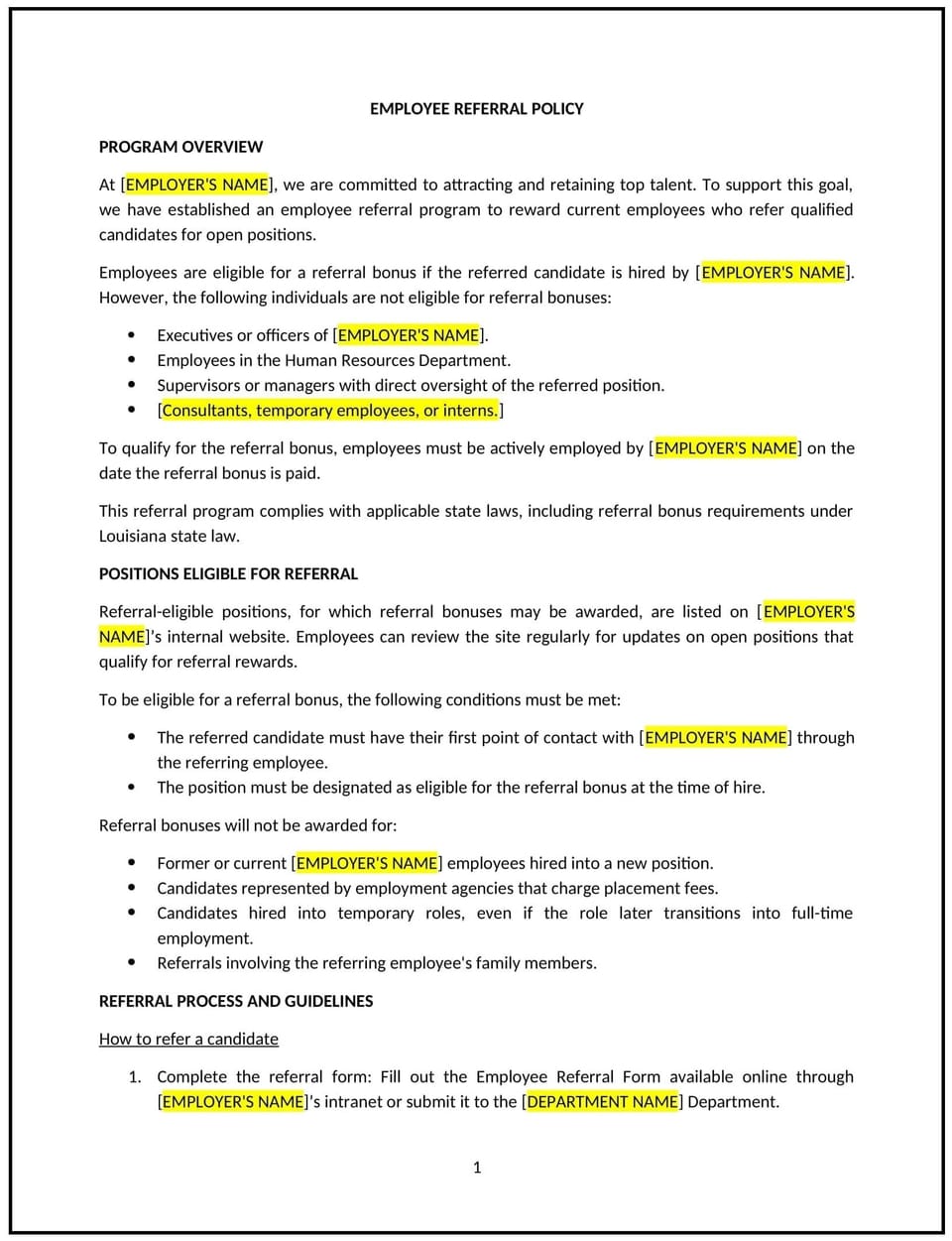Employee referral policy (Louisiana): Free template

Employee referral policy (Louisiana)
This employee referral policy is designed to help Louisiana businesses encourage employees to refer qualified candidates for open positions. It outlines eligibility, referral procedures, and incentives to create a structured and effective referral program.
By implementing this policy, businesses can expand their talent pool, improve hiring efficiency, and reward employees for contributing to recruitment efforts.
How to use this employee referral policy (Louisiana)
- Define eligible roles: Specify which positions are open for referrals, such as full-time, part-time, or specialized roles.
- Outline referral procedures: Provide steps for employees to submit referrals, including required forms or documentation.
- Clarify incentive structures: Detail the rewards or bonuses employees will receive for successful referrals, such as monetary bonuses or additional time off.
- Establish eligibility criteria: Identify which employees are eligible to participate in the program, excluding roles like HR or hiring managers if applicable.
- Communicate follow-up processes: Explain how and when employees will be notified about the status of their referral.
- Include timelines: Specify when referral rewards will be issued, such as after the referred candidate completes a probationary period.
Benefits of using an employee referral policy (Louisiana)
Implementing this policy provides several advantages for Louisiana businesses:
- Expands the talent pool: Leverages employees’ networks to find high-quality candidates.
- Enhances retention: Encourages employees to recommend candidates who align with company culture.
- Saves time and resources: Reduces reliance on external recruitment channels and shortens hiring timelines.
- Boosts employee engagement: Rewards employees for actively contributing to the company’s success.
- Reflects Louisiana-specific practices: Adapts to local hiring trends and workforce dynamics.
Tips for using this employee referral policy (Louisiana)
- Promote the program: Regularly remind employees about the referral program and its benefits.
- Keep the process simple: Streamline referral submission procedures to encourage participation.
- Recognize contributors: Publicly acknowledge employees who make successful referrals to boost morale.
- Monitor program performance: Track the success rate of referrals to identify opportunities for improvement.
- Update incentives: Periodically review and adjust rewards to keep the program attractive to employees.
Q: Which positions are eligible for employee referrals?
A: Eligible positions are typically full-time or part-time roles that are actively listed as open by the company.
Q: How can employees submit referrals?
A: Employees can submit referrals through designated channels, such as email, referral forms, or a dedicated HR platform.
Q: What rewards are offered for successful referrals?
A: Rewards may include monetary bonuses, additional vacation days, or non-monetary incentives, as specified in the policy.
Q: When will referral rewards be issued?
A: Rewards are typically issued after the referred candidate has successfully completed a probationary period or a specified duration of employment.
Q: Can all employees participate in the referral program?
A: While most employees are eligible, some roles, such as HR personnel or hiring managers, may be excluded to avoid conflicts of interest.
Q: How often should this policy be reviewed?
A: The policy should be reviewed annually or whenever changes in recruitment needs or business operations occur.
Q: How can businesses encourage employee participation?
A: Businesses can promote the program through newsletters, team meetings, and visible recognition of successful referrals.
This article contains general legal information and does not contain legal advice. Cobrief is not a law firm or a substitute for an attorney or law firm. The law is complex and changes often. For legal advice, please ask a lawyer.


